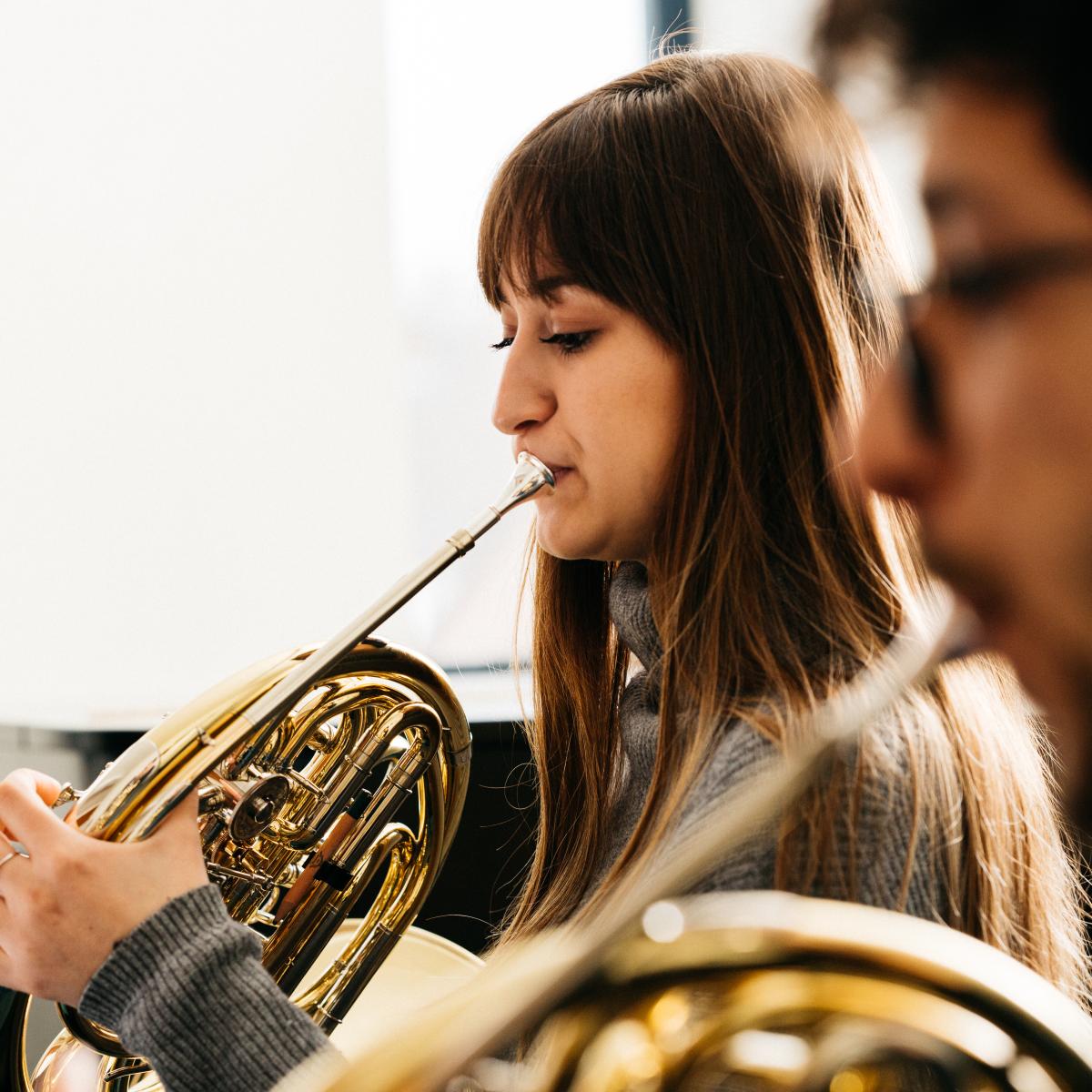
Bachelor
Horn
Students from all over the world are trained in this field to become professional horn players and are primed to play as musicians in a professional orchestra. Adriaan van Woudenberg, Jacob Slagter (Solo Hornist Concertgebouw Orchestra), Hubert Crüts (Solo Hornist Gürzenich Orchester Köln) and Erich Penzel (Professor HFM Köln) have already preceded you.
The Bachelor's programme focuses mainly on developing musical and technical skills. Much attention is paid to the standard solo repertoire, chamber music and orchestral playing.
During the Master's programme, the focus is on the creative personality and the general musical excellence of playing the horn in various musical styles from Baroque to contemporary music.
In both the Bachelor and the Master, students are trained in auditing. In preparation for important horn competitions throughout Europe.
During class concerts, students are given the opportunity to perform accompanied by piano. They learn to play together by forming ensembles with 4 to max. 18 horn players. In this way they learn flexibility, which later in the professional field is extremely important for harmonious interaction (both musically and psychologically).
Teachers Willy Bessems (1/3 Hoornist Gürzenich Orchester Köln) and Will Sanders (Professor HFM Karlsruhe, formerly Solo Hornist Symphony Orchestra Bayerischen Rundfunk, Solo Hornist Bayreuther Festspiele.) work closely together and complement each other in the field of musicality. Will Sanders has extensive experience in the symphonic field, starting in opera himself and playing chamber music and recitals at the highest level.
Willy Bessems is still active in the orchestra world and his opera knowledge is also of enormous importance.
Masterclasses are organized annually with guests such as Günther Högner, Hermann Baumann, Radovan Vlatkovitsch, André Cazalet, Radek Baborak, Guido Corti, Stefan Dohr, and Andrew Bain.
Alumni of the horn class now play in orchestras such as the Symphonie Orkest Bayerischen Rundfunk, Concertgebouw Orchestra, Rotterdam Philharmonic Orchestra, Radio Philharmonic Orchestra, WDR Symphony Orchestra, NDR Symphony Orchestra, Frankfurt Radio Orchestra, SWF Radio Orchestra, NHK Japan, Bogota Philharmoniker, etc.
Or work at universities such as The University of Arts and Music Geidai Tokyo, University EAFIT Colombia, HFM Hannover, HFM Köln, HFM Karlsruhe etc.
Meet our team
Meet your lecturers
Curriculum
Curriculum
|
Major Horn |
More info |
Year 1 |
Year 2 |
Year 3 |
Year 4 |
|---|---|---|---|---|---|
Main Subject and Components related to the Main Subject |
26 |
26 |
29 |
47 |
|
Main Subject Wind Instruments |
26 |
26 |
29 |
47 |
|
Professional Development |
5 |
3 |
3 |
||
Orientation on Profession |
5 |
||||
Basic Teaching Skills Instrument Specific Methodology |
1 |
||||
Basic Teaching Skills Lectures |
1 |
||||
Studio Recording Preparation |
1 |
||||
Your Art as a Business Basic Course |
2 |
||||
Your Art as a Business Electives |
1 |
||||
Music Theory |
22 |
23 |
12 |
||
Skills Lab |
6 |
8 |
|||
Creative Lab |
8 |
8 |
|||
Capstone |
4 |
||||
History of Music |
3 |
2 |
|||
Choir |
2 |
||||
Choir Classical (General) |
2 |
2 |
|||
Applied Piano Classical |
3 |
3 |
|||
Elective Theory Modules |
8 |
||||
Ensemble |
7 |
8 |
8 |
6 |
|
Projects A |
4 |
4 |
4 |
4 |
|
Chamber Music |
2 |
2 |
2 |
2 |
|
Wind Band Lessons |
1 |
2 |
2 |
||
Minor |
8 |
7 |
|||
Free Space |
8 |
7 |
Before you apply
Admission
requirements
First round
The audition consists of two rounds. For the first round, the candidate needs to record 2 videos that contain:
-
Video 1: A short introduction of him/herself in English: talk about your musical experiences, your motivation to study music, your main subject and why you choose to audition at Conservatorium Maastricht.
-
Video 2: In the second video, the candidate demonstrates his/her artistic and technical skills. The video should be recorded in one take, without cuts or any edits. The candidate should start by speaking their name and student number of Conservatorium Maastricht. The video should contain:
Études
Two etudes of contrasting character, having the level of the following etudes:
-
C. Kopprasch: Volume 1 or Volume 2
-
B. Müller: Volume 1 or Volume 2
-
H. Kling: 40 Characteristic etudes
Recital pieces
Two recital pieces: concerto, sonata or solo piece of contrasting character, having the level of the following pieces:
-
W.A. Mozart: Horn concerto no. 2 or 3
-
F. Strauss: Horn concerto op. 8
-
P. Hindemith: Sonata in F
-
B. Kroll: Laudiatio for horn solo
Additional video’s (not required): The candidate may provide concert video registrations.
The videos should be uploaded to an online platform such as YouTube.com or Vimeo.com. It is the candidate’s responsibility to make sure that the video links work.
Second round
The candidate will be invited to come to Maastricht for an in-person live audition. The repertoire for the live audition remains the same. Additional repertoire requests can be made by the committee.
In the second round, the candidate is invited for an online theory test which determines whether the candidate is admissible. More information about the theory test may be found here.
Additionally, the theory department may re-invite the candidate for a level test to determine whether the candidate can start the theory program on a higher level.